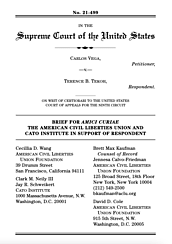Learn more about Cato’s Amicus Briefs Program.
The seminal Supreme Court case Miranda v. Arizona created protocols requiring police to inform suspects of certain constitutional rights before asking them questions in a custodial setting. In most cases, introducing a defendant’s un-Mirandized statement against them at trial violates their Fifth Amendment right against self-incrimination, as such statements are presumptively coerced. In this case, Terence Tekoh, a certified nursing assistant, alleged that Deputy Carlos Vega coerced a false confession from him during an hour-long interrogation, suggesting that Tekoh touched a patient inappropriately. There was no dispute that Vega failed to give any Miranda warnings during the encounter, and Tekoh alleged that Vega lied to both prosecutors and the court about the interrogation throughout Tekoh’s subsequent criminal trial, falsely claiming that Tekoh offered the statement without any interrogation and that Tekoh was not in “custody.” At trial, Tekoh’s coerced confession was admitted against him, thereby violating his Fifth Amendment rights, but the jury acquitted him. Tekoh then filed a Section 1983 suit against Vega, alleging that Vega’s conduct caused the violation of his Fifth Amendment rights at trial.
The question before the Court in this case is when and whether a police officer can be liable under Section 1983 when they take an un-Mirandized statement from a suspect and cause that statement to be admitted against the suspect at trial. One threshold question is whether the Miranda rules are constitutional commands in their own right, or simply “prophylactic” rules designed to guard against other constitutional violations. In other words, does a police officer violate a suspect’s constitutional rights (and therefore become liable under Section 1983) simply by virtue of failing to properly instruct them as to their Miranda rights? Vega’s primary argument to the Court was that, even if he did violate the Miranda rules in obtaining Tekoh’s statement, that violation can’t support a Section 1983 suit against him because those rules sweep broader than the Fifth Amendment itself.
However, Cato (along with the ACLU) filed an amicus brief in support of Tekoh, explaining how, even assuming that Miranda is “merely” prophylactic, an officer who violates Miranda may, in some cases, proximately cause the subsequent violation at trial. In this case, Deputy Carlos Vega didn’t simply ignore Miranda in his interrogation of Terence Tekoh; he also lied about that interrogation in a way that foreseeably resulted in the unlawful admission of Tekoh’s statement at trial. In other words, we acknowledge that the relevant constitutional violation occurs when an un-Mirandized statement is admitted at trial, not when it is taken, and therefore that a police officer is not liable under Section 1983 anytime they fail to give Miranda warnings. However, when there is additional evidence that the police officer not only took an un-Mirandized statement, but thereafter took actions causing that statement to be unlawfully admitted at trial – like lying to prosecutors and the court about the interrogation – the jury should be permitted to determine whether the police officer’s conduct was a proximate cause of the Fifth Amendment violation.

This work is licensed under a Creative Commons Attribution-NonCommercial-ShareAlike 4.0 International License.


